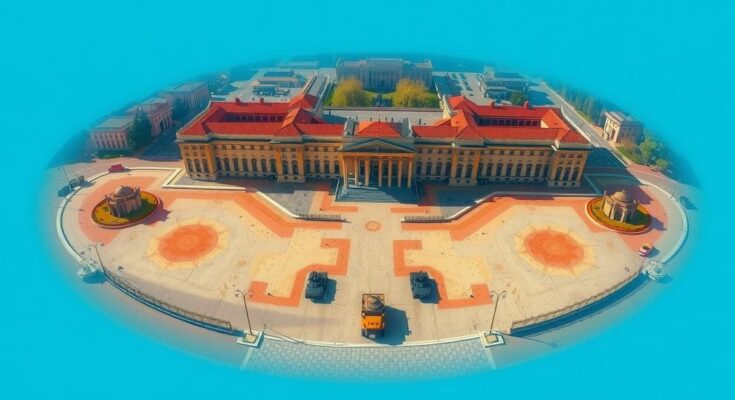Sudan’s military has retaken the Republican Palace in Khartoum from rival RSF forces, marking a significant victory after nearly two years of conflict. Video announcements confirmed this development, with reports highlighting the ongoing humanitarian crisis and alarming death tolls. The palace, a key historical site, symbolizes the power struggle following the 2019 uprising and the subsequent military coup in 2021.
Sudan’s military has announced the successful retaking of the Republican Palace in Khartoum from rival paramilitary forces after nearly two years of intense conflict. Video footage shared on social media depicts military personnel inside the compound, declaring the seizure coinciding with the 21st day of Ramadan, which fell on a Friday. Al-Aiser, the Sudanese information minister, confirmed the military’s claim, stating, “Today the flag is raised, the palace is back, and the journey continues until victory is complete.”
The Republican Palace, a symbolic site along the Nile River historically associated with the Sudanese government, has experienced extensive damage. Soldiers were observed navigating through rubble and chanting religious phrases in celebration, signifying a significant military victory for the Sudanese forces. Over recent months, the military, led by General Abdel-Fattah Burhan, has systematically pushed back the Rapid Support Forces (RSF) from the capital, Khartoum, since hostilities reignited in April 2023.
Despite this advancement, conflict persists in the region, with sporadic gunfire audible throughout Khartoum, leaving the nature—whether celebratory or combative—ambiguous. The RSF, commanded by General Mohammed Hamdan Dagalo, has not yet publicly acknowledged their loss of control over the palace. Meanwhile, the RSF claimed to have gained control of the strategic city of al-Maliha, approximately 125 miles north of El Fasher, as skirmishes continue in the area.
The humanitarian situation in Sudan has escalated, with the head of the UN children’s agency highlighting this conflict as the world’s largest humanitarian crisis. Death toll estimates from the fighting exceed 28,000 individuals, with millions displaced and alarming reports of famine emerging. The Republican Palace has historical significance, having served as a seat of power during British colonization and the first years of Sudanese independence.
Sudan’s instability can be traced back to 2019, when a popular uprising ousted long-time autocrat Omar al-Bashir, who was later charged with genocide regarding the conflicts in Darfur. The supposed transition to democracy crumbled when General Burhan and General Dagalo orchestrated a military coup in 2021, leading to the current hostilities between their factions. Human rights abuses have been alleged on both sides, and prior to President Biden’s exit from office, the US State Department accused the RSF of committing acts of genocide. Both parties have since denied these accusations.
In conclusion, the retaking of the Republican Palace marks a vital military achievement for Sudan’s armed forces amidst an ongoing humanitarian crisis and conflict with the RSF. The historical and strategic significance of the palace underscores the continuing struggle for power dynamics in Sudan. Despite military advances, challenges remain, including widespread humanitarian concerns and ongoing allegations of human rights violations, highlighting the complex and tumultuous landscape of Sudan’s political situation.
Original Source: www.irishnews.com




